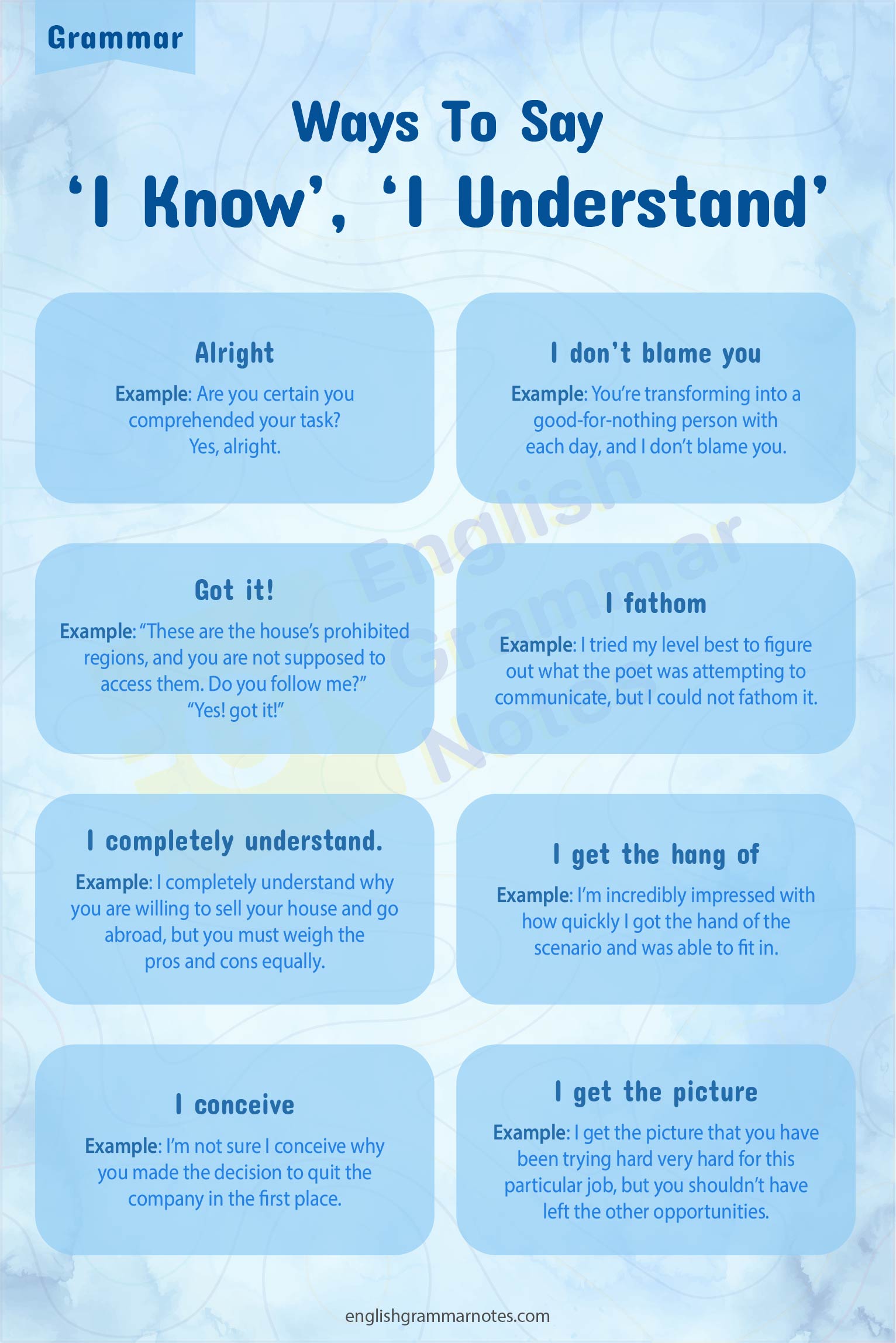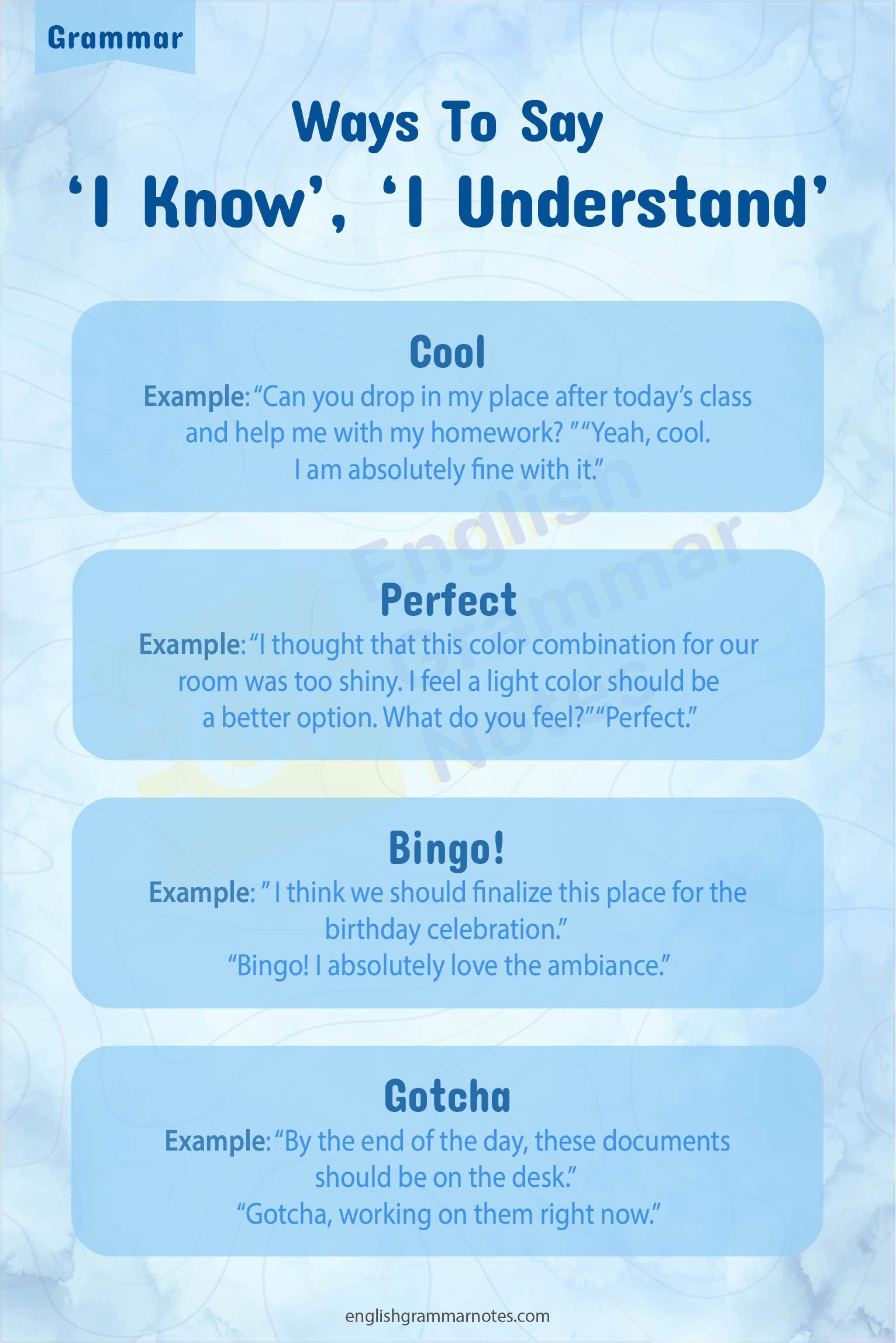Other Ways To Say ‘I Know’, ‘I Understand’ in English: There’s no need to keep to a tried-and-true method of articulating yourself. There are many other ways to express it, and you must explore them all.
English is a multifaceted language that allows people to express themselves in a multitude of ways.
Your professional life, regardless what your position or rank, is continuously putting challenges on you. More often than not, directly replying, “I understand,” will not be enough. Knowing how to say I understand professionally will always offer you an added edge over your friends and peers.
Besides being aware of another way to say I completely understand, you should also be particularly cognizant of how to respond to I understand.
This article contains a range of phrases and words that you may utilize to indicate that you comprehend something, as well as to continue to expand your English vocabulary and enhance your speaking ability.
Ways To Say ‘I Know’, ‘I Understand’ in English
- Phrases and expressions you can use alternatively to ‘I Know,’ ‘I Understand’ with examples
- Informal ways to say ‘I Know,’ ‘I Understand’ with examples
- Conclusion
Phrases and expressions you can use alternatively to ‘I Know,’ ‘I Understand’ with examples
Alright
Example: Are you certain you comprehended your task? Yes, alright.
Fair enough
Example: “Despite promising that I would be early for the party, I completely forgot about my appointment with the overseas customer today.” “Fair enough, you’re welcome to come once the meeting is done.”
Got it!
Example: “These are the house’s prohibited regions, and you are not supposed to access them. Do you follow me?” “Yes! got it!”
I am aware
Example: I am aware of the responsibilities that my job entails, and I am reluctant to go above and above without even being properly compensated.
I appreciate why you think that.
Example: I appreciate why you think that way, but at the end of the day, you must take accountability for the damages your organization suffered.
I completely understand.
Example: I completely understand why you are willing to sell your house and go abroad, but you must weigh the pros and cons equally.
I conceive
Example: I’m not sure I conceive why you made the decision to quit the company in the first place.
I don’t blame you
Example: You’re transforming into a good-for-nothing person with each day, and I don’t blame you.
I fathom
Example: I tried my level best to figure out what the poet was attempting to communicate, but I could not fathom it.
I get it.
Example: I get why you chose to stay at home and skip the victory celebration.
I get the hang of
Example: I’m incredibly impressed with how quickly I got the hand of the scenario and was able to fit in.
I get the picture
Example: I get the picture that you have been trying hard very hard for this particular job, but you shouldn’t have left the other opportunities.

I get you
Example: “Do not leave this place until I reach.” “I get you!”
I grasp
Example: All that I grasped after today’s seminar was that data science is the need of the hour.
I have knowledge of
Example: I feel ashamed to admit that I had the knowledge of his embezzlement in the company.
I hear what you are saying.
Example: “This is an important discussion for the future of the company.” “I hear what you are saying, but I do not completely agree with it.”
I hear you
Example: Yes, I hear you and will get on with the changes right now.
I identify with
Example: I identify with the needs of the company at this hour.
I infer
Example: I tried to infer what changes the client wants.
I know
Example: I know what needs to be done to get rid of this crisis.
I know what you mean.
Example: I know what you mean, and you do not need to assert yourself twice.
I noticed
Example: I noticed and executed all of the required measures to modify this construction.
I perceive
Example: I perceive what you are trying to imply, but what you really want to accomplish right now is virtually impossible.
I recognize
Example: I recognize the urgency of the situation, and I urge that everyone does the same and makes necessary adjustments.
I see
Example: “I will not be able to wear this dress to the event tomorrow.” “I see.”
I see where you are coming from
Example: Now that I stand in your shoes, I see where you are coming from, and I believe what you’re saying makes sense.
I see your point.
Example: “What I’m trying to basically imply is that we must focus exclusively on our work rather than gossiping.” “I see your point, but when we’re meant to be working, though, we never really chatter.”
I take your point
Example: I take your time, but I don’t believe there is anything we can accomplish immediately now.
I understand
Example: “I am now strapped for cash and do not think I will be capable of making such a significant investment at this moment.” “It’s perfectly OK; I understand. You proceed at your own pace.”
I would feel the same.
Example: I’m sure I would feel the same way if I had to go through anything similar at such an early age in my teaching profession.
It’s crystal clear.
Example: It’s crystal clear what you intend to convey, so don’t try to twist or sugar-coat your remarks.
Of course
Example: “Could you kindly let him know that his shipment will arrive a day earlier?” “Of course.”
OK
Example: “If you make this error again, you will be dismissed.” “OK, I will make sure that I do not commit this mistake again.”
Sure
Example: I’m sure figuring out who actually broke into our database wouldn’t be tricky.
That’s clear, thank you.
Example: “Should I go through the terms and conditions once more?” “That’s clear, thank you.”
That’s totally fair.
Example: “Because Ramesh was the one who originally developed the theory, his name should appear first on the credentials.” “That’s totally fair, and no one should have a problem with it.”
To catch on
Example: Ram tends to catch on very quickly and effortlessly.
To catch one’s drift.
Example: I won’t say who the offender is, but if you catch my drift, it really shouldn’t take you more than just a moment to figure it out.
To catch
Example: It took me a while to catch what he was suggesting to change in the presentation.
To get the gist of something.
Example: “Are you sure you got the gist of the travel itinerary for tomorrow’s journey?”
To follow
Example: “You were asked to follow the rules and regulations of the place strictly. What you did was utterly despicable.”
Informal ways to say ‘I Know,’ ‘I Understand’ with examples
Cool
Example: “Can you drop in my place after today’s class and help me with my homework? ” “Yeah, cool. I am absolutely fine with it.”
Perfect
Example: “I thought that this color combination for our room was too shiny. I feel a light color should be a better option. What do you feel?” “Perfect.”
Bingo!
Example: ” I think we should finalize this place for the birthday celebration.” “Bingo! I absolutely love the ambiance.”
Gotcha
Example: “By the end of the day, these documents should be on the desk.” “Gotcha, working on them right now.”

Conclusion
In English, there are numerous synonyms for a particular phrase. So, why be boring and predictable by endlessly saying the most frequently utilized phrase?
The usage of the appropriate phrase comes down to the individual and the context in question.
The phrases mentioned above are all routinely used words that may be used indiscriminately to maintain the impression that you are proficient in the language.